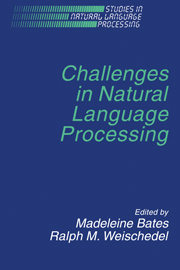Book contents
1 - Critical challenges for natural language processing
Published online by Cambridge University Press: 05 March 2010
Summary
Introduction
Although natural language processing (NLP) has come very far in the last twenty years, the technology has not yet achieved a revolutionary impact on society. Is this because of some fundamental limitation that can never be overcome? Is it because there has not been enough time to refine and apply theoretical work that has already been done?
We believe it is neither. We believe that several critical issues have never been adequately addressed in either theoretical or applied work, and that, because of a number of recent advances that we will discuss, the time is due for great leaps forward in the generality and utility of NLP systems. This paper focuses on roadblocks that seem surmountable within the next ten years.
Rather than presenting new results, this paper identifies the problems that we believe must block widespread use of computational linguistics, and that can be solved within five to ten years. These are the problems that most need additional research and most deserve the talents and attention of Ph.D. students. We focus on the following areas, which will have maximum impact when combined in software systems:
Knowledge acquisition from natural language (NL) texts of various kinds, from interactions with human beings, and from other sources. Language processing requires lexical, grammatical, semantic, and pragmatic knowledge. Current knowledge acquisition techniques are too slow and too difficult to use on a wide scale or on large problems. Knowledge bases should be many times the size of current ones.
Interaction with multiple underlying systems to give NL systems the utility and flexibility demanded by people using them. Single application systems are limited in both usefulness and the language that is necessary to communicate with them.
[…]
- Type
- Chapter
- Information
- Challenges in Natural Language Processing , pp. 3 - 34Publisher: Cambridge University PressPrint publication year: 1993
- 3
- Cited by



